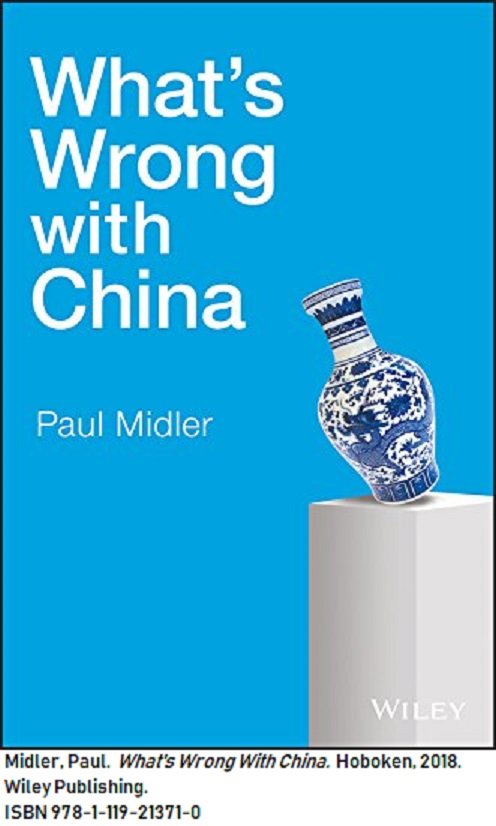Book Review: "What's Wrong With China" by Paul Midler
In my earlier review of Stephen Mosher's Bully of Asia I remarked on how gratifying (and simultaneously frustrating) it is to open a book by a professional China-watcher and read some of the exact same conclusions I have come to after living here for 5 years but have been told "that's ridiculous" by people whose information comes from the mainstream media. This was the experience that awaited me once more within the pages of Paul Midler's What's Wrong With China, a book which, unsurprisingly, I would never find available here in Beijing (but which, surprisingly, was available at one of the airport bookstores in Hong Kong). As the title rather unabashedly suggests, this book falls within the once-derided-now-popular vein of China-sceptic political literature, though I have not found many other books on the topic which so heavily feature first-hand experiences rather than digging up sources from others. The scholar in me certainly wouldn't have minded if the author had used a few more citations (and by "a few more" I mean "a few;" the book does not have a single one), but there's always something to be said for information that comes straight from the proverbial horse's mouth.
A Comparison With Bully of Asia
It's easy to draw parallels between this book and its author, and Bully of Asia and its author. Both books are rather unhesitantly critical of not only China's government or its ruling Party, but of Chinese society itself. Both authors spent years in China as students and are fluent in Mandarin. Both books agree that China's own cultural quirks (including an obsession with their past status as the self-anointed "Central Nation") make the country completely incapable of being trustworthy. Both books completely skewer the notion that China was an idyllic, enlightened society until the Communist Party came along, insisting instead that the Communist Party was little more than the fulfillment of the already existing vices in Chinese culture (Mosher, pp. 68, 193 & 273 among others; Midler 93 - 98).
However, while Bully of Asia is a firebreathing, vitriolic litany of (basically true) accusations, sounding for all the world like a prosecuting attorney's opening remarks, What's Wrong With China has more of an eye-rolling tone, reminiscent of someone describing that one co-worker who should have been fired long ago but who always seems to know when the boss is looking, the one who no one bothers to confront because everyone knows is just never going to grow up and pull his weight. Bully of Asia also goes to great lengths to highlight China's strengths, while What's Wrong With China points out the country's weaknesses (though it stops short of echoing Gordon Zhang's "China will collapse soon" postulations, settling for a less headline-grabbing assertion that China will soon go through a stagnant period similar to Japan's "lost decade," except lasting longer (pp. 159 - 165)). And finally, it is also worthy of mention that Bully of Asia is largely chronological, with the theme of China as, well, the regional bully in Eastern Asia throughout different epochs, running throughout the book in a thoroughly organized and methodical fashion, while What's Wrong With China is arranged as a collection of recollections and anecdotes, with each chapter focussing on a specific quirk of the country. A reader could almost shuffle the chapters up and read them in any order without losing their ability to understand the book.
To put the difference between the two books in a nutshell, Bully sounds an alarm saying they are dangerous enough to be a threat while What's Wrong is more of a casual admonition: "leave 'em alone. They're a lost cause, and not worth the effort."
For my part, which of the two I find myself more inclined to agree with on any given day depends largely on how successful I've been at managing not to get screwed by the damned Zhonghua Minzu that day, but never mind.
It Would Be Hilarious... Except, It's True
With the exception of a few moments of chilling reflection (p. 182, & 199 - 202), this book delivers its message in a manner so comedic it stops just short of flippant. From the conversation between a vendor who had to explain to a Chinese supplier that black and navy blue are not, in fact, synonyms and since his customer was in Australia he would need the product in "Australian black (p. 81)" to the account of a group of Chinese chemists who insisted that the chemicals they used could not be found on the periodic table of elements because it was a "foreign chart" and their chemicals were only found in China (p. 82); from an instance where a Chinese industrialist's paranoia over his American client's innocuous trip to Shanghai leads him to panic when he asks the author why the client is going there (only to become the victim of the sadistic author's delightfully vicious humor when the author whispers, spy-like, that he can't answer that question (p. 181), to one of the most perfect portrayals of how Western businesses find themselves being nickeled and dimed here without realizing that their Chinese partners are, in fact, out to screw them from the beginning (p. 169 & 170), this piece manages to actually make the topic of "why Chinese society simply does not lend itself to producing trustworthy partners" fun to read. Many of the anecdotes the author offers read like a sitcom script set in a chronically inefficient office where every cast member is out to skim what they can off the top while the oblivious (and typically exasperated) boss tries in vain to figure out why nothing in his office ever seems to happen the way it is supposed to. Practically the only time I stopped laughing while I was reading this was when I closed it, thought about the number of times I'd witnessed the very same idiocy he writes about and said with a sigh, "you know, he wasn't kidding."
So, Would I Recommend It?
Absolutely.
The majority of the book focuses on what to watch out for when doing business in/with China (the author's urgent advice that if your auditor in China is hated by the Chinese then "you leave that guy right where he is (p. 30)" proved to me that the author knew what he was talking about, as did his admission that learning Mandarin doesn't really help (p. 207)), but it has relevance for anyone in the West. The one sentence which stands as an answer to the title question appears on p. 201, and at the risk of being melodramatic, when I read this sentence it was as if the Heavens opened, the light of God shone down on the page and I heard the distant echoes of Handel's Hallelujah Chorus.
Much of what is wrong with China is actually something wrong with us. We are too fond of this country.
This fact, a fact hinted at by Ben Chu in the closing chapter of Chinese Whispers (namely, that we in the West need to get over our seemingly ingrained desire to view China as a magical, exotic fantasy land out of some fairy tale), rears its head repeatedly throughout Midler's work (p. 201, 215, 216, 221), and with it are rebukes against the Western media (and, by extension, anyone who gets the majority of their information from the Western media) for their tendency to believe everything the Chinese government tells them (p. 149) as well as their penchant for laying the blame for all the world's problems at the feet of the West (p. 15 & 221). While it's a bit more sugar-coated than Mosher's Bully of Asia, it's still a dose of the same pill, and that pill is "it's time to get over the fawning adoration of China and recognize that the country is incurably sick."

Works Cited
Chu, Ben. Chinese Whispers. London, 2013. Weidenfeld & Nicolson.
ISBN 978-1-7802-2474-9
Mosher, Stephen F. Bully of Asia. Washington, 2017. Regnery Publishing.
ISBN 978-1-62157-696-9
